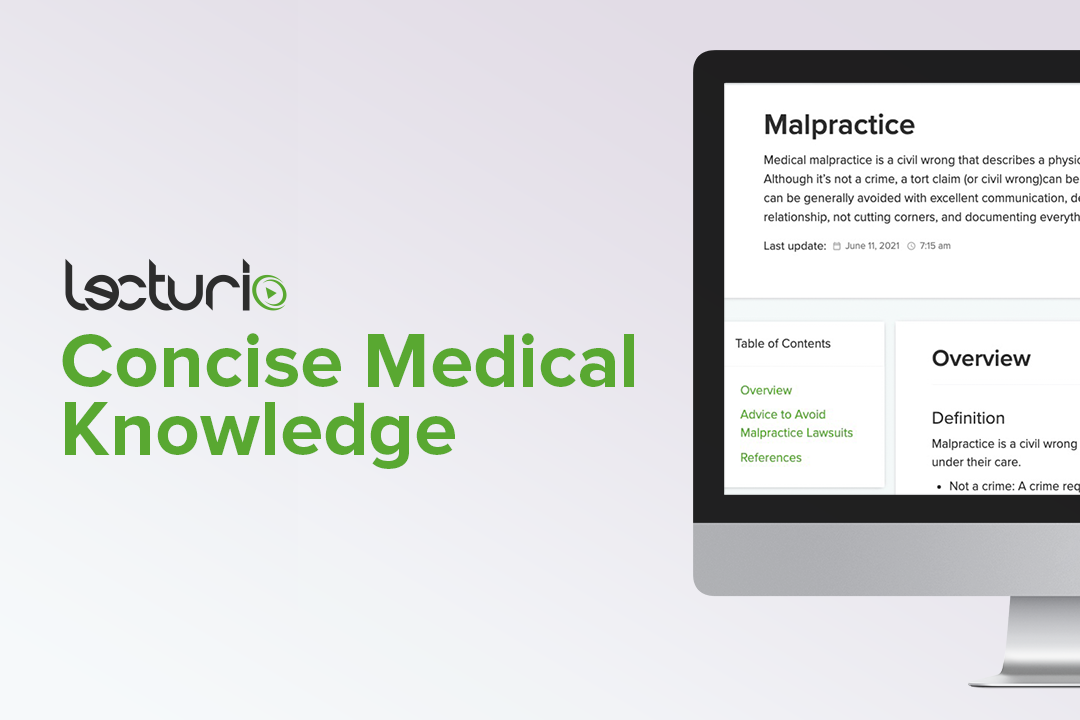Playlist
Show Playlist
Hide Playlist
Impact of Medical Errors
-
Slides Impact of Medical Errors.pdf
-
Download Lecture Overview
00:01 Now that we've looked at some of the important root causes of medical errors, let's look at their impact. 00:07 The impact of medical errors influences not only patients but healthcare providers. 00:12 It's important that we consider both of these parties when we're looking at the impact of medical errors. 00:17 Although the saying exists, "To err is human." There's a report on safety in health care that was issued by the Institute of Medicine publication in 1999. 00:27 This states in parts that medical errors are inevitable, and they can have a disastrous effect on the patient, a treating doctor, nurses, the institution as well. 00:38 So medical error has a 360° sphere of influence. 00:41 It affects the individual, the healthcare team, the patient and their family. 00:46 It is imperative therefore to build a safe working environment. 00:50 Ways that we can accomplish this are, for example, by appropriate policies and procedures which minimize risk and maximize benefits to patients. 00:59 The second is the establishment of appropriate protocols, which can be devised by committees or suggested by individuals. 01:06 When protocols are followed. 01:08 For example, we've seen this with central line infections in the intensive care unit, the amount of errors decreases significantly. 01:16 And then finally, a provision of appropriate training. 01:19 This is not only true for our house staff, our residents, our interns, but continuing medical education, even for experienced physicians is crucial to keep one's knowledge base in a good status and to avoid errors due to lack of knowledge. 01:35 There's a report on safety and health care that we had talked about. 01:40 And this says that virtually all doctors have made mistakes. 01:43 And I think we all know this, doctors, nurses, all clinicians have been subjected to error at some point. 01:49 Although in clinical practice errors are common, it is established that they are generally under reported. 01:55 There is a tendency when we make an error to want to withhold that error. 01:59 And I would like to convince you the fact that that is not a wise choice. 02:03 It's an understandable choice but it does a disservice to everyone at the end of the day. 02:07 Although it may be difficult for an individual to identify a given mistake and we may not have made the mistake if we had appreciated what it was in the beginning. 02:16 Once a mistake is identified, an individual must face that situation, must deal with the consequences and must try to learn from it and prevent future errors. 02:26 This is particularly important when we disclose errors to patients. 02:29 Sometimes patients are more willing to accept errors if they see that some good for other patients may benefit from this down the line. 02:37 As a consequence of medical errors, healthcare providers at all training levels may experience feelings of guilt, feelings of disappointment, fear, or a sense of inadequacy. 02:49 When we're used to doing things well, and we do something poorly, it can be very devastating to an individual. 02:55 And it's important that we deal with this honestly and appropriately and with a sense of compassion. 03:00 This is especially important when we are discussing these issues with junior medical staff or those who are in training as they are a particularly vulnerable population. 03:09 This is early on in their experience and they may not have the breadth of medical interactions which may balance out this particular error. 03:17 There's also the sense that they are being evaluated and they need to achieve a certain status in order to pass to the next level, there may be a fear of disclosure for a fear of not being promoted or being passed through. 03:30 Now that we've talked about the impact on the healthcare team, let's face the impact on the patients. 03:35 And this may vary depending on the nature of the error and of the patient. 03:38 But these effects could include physical, psychological, emotional, financial, and doctor-patient relationship facets to them. 03:51 We talk about these different aspects of the patient, and the doctor-patient relationship in fact may be compromised if an error is not disclosed. 03:59 Strange as it may sound, a doctor-patient relationship may be enhanced if an error is disclosed honestly and with compassion and sympathy. 04:07 Furthermore, I'd like to add that the effect on the family and loved ones is not to be ignored here. 04:12 This is the 360° sphere of influence that I mentioned earlier. 04:17 The patient exists within a given support system and an error which a patient experiences extends to their support system as well. 04:24 So how do we combat this? Well, the practice of effective disclosure is absolutely critical. 04:29 We have a professional ethical obligation to inform our patients regarding all aspects of their care including medical errors. 04:37 Although this is important at all times it becomes magnified during the time when a medical error has been made. 04:44 We have to remember that it is best to do what is best for the patient and for their family. 04:51 It is important to try to understand and support the needs of the patient and the family in this moment as they evolve. 04:57 This can be a time of great unrest of anxiety and our ability to remain calm but open in our disclosure is crucial. 05:05 If we do this, it is much more likely that we will maintain an atmosphere of trust as we navigate through this difficult situation with the patient. 05:13 The question then stands, how much detail should be disclosed? And this is a very fair question. 05:18 It's very important that we disclose only what is known. 05:21 We do not want to speculate, be honest, be open, but do not make inferences that we do not know the answers to at this time. 05:29 Very importantly, we do not want to delayed speaking with the patient. 05:33 We may not have all the answers, and that's okay. 05:36 Disclose what you know, be honest, be prompt, and don't speculate beyond that. 05:42 A sense of reassurance is important, although I've said it's important to be honest, it's also important to be compassionate, it is possible to do both things. 05:51 Putting yourself in the patient or the family's position can be helpful and acknowledging how difficult it must be for them to hear this and inviting them to express their concerns and ask questions is absolutely crucial. 06:05 If we go in and we don't give them a chance to air out what they're experiencing, we've only done half of our job. 06:12 And then finally to offer support, not only in that moment, but offering ongoing support as this process begins to manifest itself. 06:21 Is it appropriate to apologize to offer frank apology at this time? Well, an apology in fact, can be very appropriate and very appreciated. 06:29 Once again, we do not want to enter into the realm of speculation. 06:32 But we do want to express empathy. 06:35 What are some examples of this? So, an expression of empathy can be considered appropriate often through the language of apology, for example, "I'm very sorry that you have to go through this." That shows compassion. 06:47 If there has been an error that we have clearly identified, then an apology can also take the form of an example such as, "I am very sorry that we gave you the wrong dose of medication." This is a very specific apology and speaks to the issue and also expresses our compassion to the patient. 07:05 Finally, we want to attend to any questions or concerns as mentioned earlier, giving the patient and a family a chance to express what they are feeling at this time is absolutely crucial. 07:17 So what are some points to remember about these medical errors? Well firstly, if it's appropriate, explain that you or your institution is looking into why the event occurred, and that you will get back to them when you have further information. 07:31 Secondly, if there has been an error, then it is important to express that you and your institution are committed to learning from this error and to working to improve processes to prevent a similar event from happening again. 07:44 I've seen numerous patients who take this news as difficult as it may be better if they feel that others may learn from their experience and it may be avoided in the future. 07:54 And then finally, we want to be aware of our own emotions so they do not interfere with our ability to be transparent and compassionate with patients. 08:03 This is a very anxious time not only for patients, but for those of us who are in the position of having to explain what happens.
About the Lecture
The lecture Impact of Medical Errors by Michael Erdek, MD, MA is from the course Medical Errors.
Included Quiz Questions
Who is impacted by a medical error?
- Patient, doctor, nurse, institution
- Patient
- Patient, doctor
- Doctor
- Doctor, nurse
What are measures that can limit medical errors?
- Policies and procedures, protocols, training
- Education
- Protocols and wellness activities
- Wellness activities
- Punishment
What is NOT a typical impact of a medical error on the healthcare team?
- Pride
- Guilt
- Disappointment
- Fear
- Sense of inadequacy
Which of the following is NOT a usual impact of a medical error on the patient?
- Sense of inadequacy
- Physical harm
- Emotional harm
- Financial harm
- Strain in the patient–doctor relationship
Which of the following is an important principle when discussing a medical error?
- Do not speculate.
- Delay speaking with the patient.
- Offer a cure.
- Do not place yourself in the patient's position.
- Offer to be available once the patient is discharged from the hospital.
Customer reviews
5,0 of 5 stars
| 5 Stars |
|
5 |
| 4 Stars |
|
0 |
| 3 Stars |
|
0 |
| 2 Stars |
|
0 |
| 1 Star |
|
0 |




